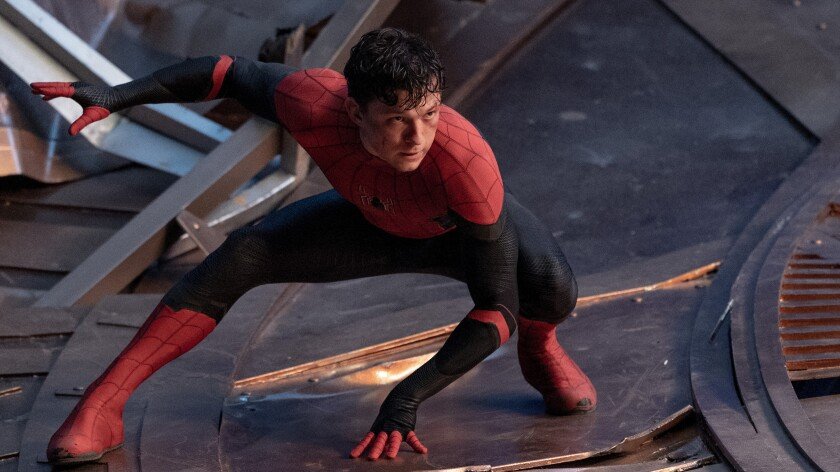"Spider-Man: No Way Home" and the Slippery Slope that is the MCU
If Spider-Man: No Way Home has confirmed anything, it’s that Spider-Man is by far the most universally beloved superhero. If you need proof of that, just look at the opening weekend box office numbers. Only one film has ever earned more money on its opening weekend, a film in which Spider-Man also appeared. You guessed it, Avengers Endgame. So in essence, the only film that has ever beat No Way Home’s opening weekend is a film with not only Spider-Man in it, but every single Marvel hero to date. This says something profound about everyone’s favorite high school webslinger, the fact that he alone can draw the same mass audience as a film containing thirty plus heroes with 21 set up movies preceding it. While No Way Home certainly benefits from the prior films, the fact still remains that people went to the theater to see Spider-Man alone.
This review will contain spoilers from the previous Tom Holland Spider-man movies.
This film picks up where “Far From Home” left off, Mysterio has revealed Peter’s identity and now he faces the reality of being the most famous person in the world while still trying to be a normal high schooler. Peter and his friends are all applying for colleges and their newfound infamy doesn’t make it any easier. So what can Peter do? Well he does what any dumb high schooler would do, he visits his friendly neighborhood sorcerer. This begins the wild ride that is “No Way Home” and allows a fitting finale for Tom Holland’s Spider-man trilogy, a trilogy that has been largely built as a coming of age story. Past Spider-Mans have been focused on Peter’s life as an adult trying to balance their social life and life as a hero. Holland’s Spider-man has added a constant school element that allows audiences to feel a greater sense of connection because we’ve all been there. Here though, Peter has been forced to grow up and to make some of the biggest decisions an individual can make. What are you willing to sacrifice in order to save others?
The difficulty of talking about “No Way Home” is that basically the entire movie is a giant spoiler. Outside of what’s in the trailers there’s nothing you can talk about that wouldn’t trigger someone who hasn’t seen it yet. Without getting into details though, the reason I think Spider-man is so universally loved is because we can all empathize with his struggle to make decisions that feel bigger than himself. The Bible is the most produced and read book in history and there’s a reason for that. Whether you believe in the message the Bible presents or not, you cannot deny the quality of the story and how influential it has been on our culture. Why are superheroes so popular? Because people love the story of a person who is willing to sacrifice themselves for the good of others. Peter Parker’s character has always been marked by loss, every major comic arc has him losing someone he loves and him inevitably fighting to make their death matter. He has always lived in a way where he puts others before himself. Jesus’s death on the cross was the ultimate example of sacrificing everything to save the lives of others. This sacrifice, the most powerful and beautiful act in history, is echoed throughout our modern stories as a way of giving hope for those who need it. “No Way Home” is filled with these moments of hope, a hero fighting to redeem those who are lost.
However, Biblical connections aside, this movie is a ton of fun. It’s been fascinating to hear some of the discourse surrounding the idea of manufactured nostalgia. While I think there’s some validity to those arguments, I would also add that Marvel is so good at making those nostalgic moments grounded in character growth and motivation. It is never out of place and very rarely does it feel forced into the story. But I do think it’s worth considering what we expect from art, especially when it comes to stories we’ve bought into fully. I often think back to the first Iron Man movie, the one that started it all, and I remember being rocked by how new it felt. We really had never seen anything like it before, and little did we know we’d be getting a lot more. And now here we are, twenty-five movies later and we’re still building on the foundation of Iron Man. There’s certainly nothing wrong with this, but I think it is fair for us to eventually wonder if there’s more to offer from these stories than just trying to connect every single piece. The MCU has put itself in a tricky position that I think it will have to navigate carefully in order to avoid alienating the entirety of its “less committed” audience. We’ve begun to reach the point where unless you have watched every Marvel movie and now every Marvel TV show, it is difficult to even fully understand what is happening in many of the most recent films. The movies have become more and more geared towards the opening night audiences who have spent the years before the movie’s release reading fan theories and Sony’s leaked actor contracts to figure out how many more films certain characters have to appear in legally. Yet, No Way Home does the seemingly impossible, it allows the layman viewer with a little light research and context, to have a truly incredible time at the movies. It might still be a bit confusing, but overall the film brings back the packed theater with clapping and roarous laughter that movie fans missed dearly. No Way Home offers us a lot of the standard MCU fare, but its use of the past also grants us the opportunity to look forward to the potential for new stories to tell, and that is extremely exciting.

